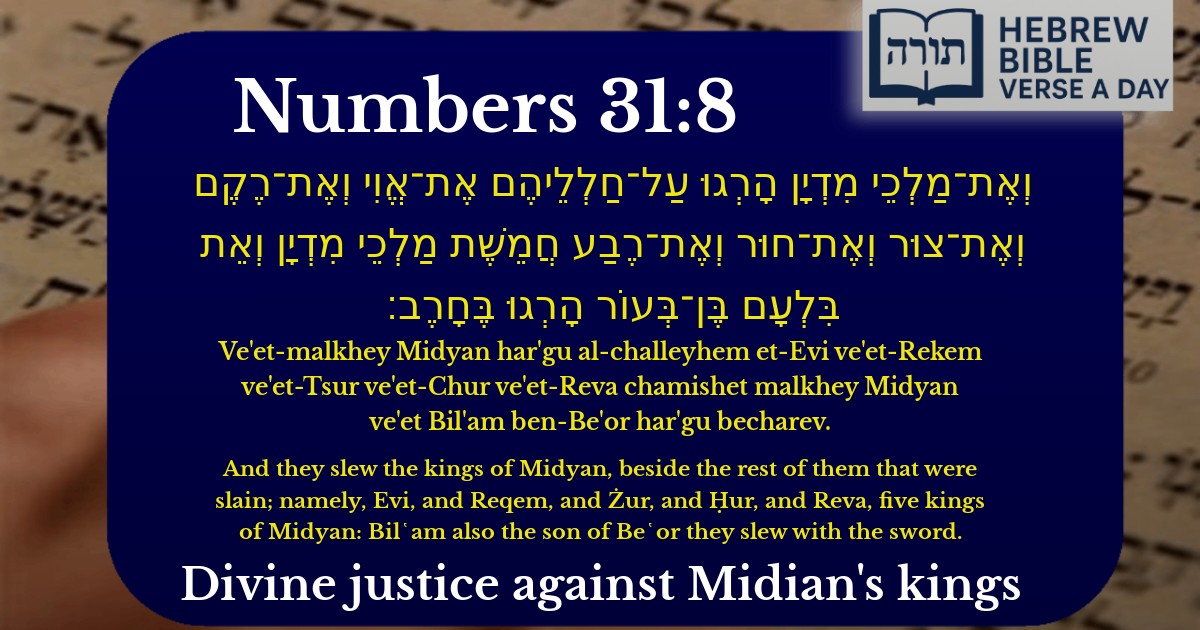Join Our Newsletter To Be Informed When New Videos Are Posted
Join the thousands of fellow Studends who rely on our videos to learn how to read the bible in Hebrew for free!
Hebrew Text
וְאֶת־מַלְכֵי מִדְיָן הָרְגוּ עַל־חַלְלֵיהֶם אֶת־אֱוִי וְאֶת־רֶקֶם וְאֶת־צוּר וְאֶת־חוּר וְאֶת־רֶבַע חֲמֵשֶׁת מַלְכֵי מִדְיָן וְאֵת בִּלְעָם בֶּן־בְּעוֹר הָרְגוּ בֶּחָרֶב׃
English Translation
And they slew the kings of Midyan, beside the rest of them that were slain; namely, Evi, and Reqem, and Żur, and Ḥur, and Reva, five kings of Midyan: Bil῾am also the son of Be῾or they slew with the sword.
Transliteration
Ve'et-malkhey Midyan har'gu al-challeyhem et-Evi ve'et-Rekem ve'et-Tsur ve'et-Chur ve'et-Reva chamishet malkhey Midyan ve'et Bil'am ben-Be'or har'gu becharev.
Hebrew Leining Text
וְאֶת־מַלְכֵ֨י מִדְיָ֜ן הָרְג֣וּ עַל־חַלְלֵיהֶ֗ם אֶת־אֱוִ֤י וְאֶת־רֶ֙קֶם֙ וְאֶת־צ֤וּר וְאֶת־חוּר֙ וְאֶת־רֶ֔בַע חֲמֵ֖שֶׁת מַלְכֵ֣י מִדְיָ֑ן וְאֵת֙ בִּלְעָ֣ם בֶּן־בְּע֔וֹר הָרְג֖וּ בֶּחָֽרֶב׃
וְאֶת־מַלְכֵ֨י מִדְיָ֜ן הָרְג֣וּ עַל־חַלְלֵיהֶ֗ם אֶת־אֱוִ֤י וְאֶת־רֶ֙קֶם֙ וְאֶת־צ֤וּר וְאֶת־חוּר֙ וְאֶת־רֶ֔בַע חֲמֵ֖שֶׁת מַלְכֵ֣י מִדְיָ֑ן וְאֵת֙ בִּלְעָ֣ם בֶּן־בְּע֔וֹר הָרְג֖וּ בֶּחָֽרֶב׃
🎵 Listen to leining
Parasha Commentary
📚 Talmud Citations
This verse is quoted in the Talmud.
📖 Sanhedrin 106a
The verse is referenced in a discussion about Balaam (Bil'am) and his death, with the Talmud noting that he was killed by the sword as mentioned in this verse.
📖 Sotah 43a
The verse is cited in the context of discussing the five kings of Midian and their fate, particularly focusing on the justice of their punishment.


The Slaying of the Midianite Kings and Bilam
The verse recounts the execution of the five Midianite kings and Bilam ben Beor during the war against Midian (Bamidbar 31:8). This event holds significant theological and moral implications in Jewish tradition.
Significance of the Five Kings
Rashi (Bamidbar 31:8) explains that these five kings correspond to the five nations that Balak, king of Moab, gathered against Israel (Bamidbar 22:4). The Midrash Tanchuma (Matot 3) suggests that each king represented a different aspect of Midianite opposition to Israel:
The Execution of Bilam
The inclusion of Bilam's death here is particularly noteworthy. The Talmud (Sanhedrin 106a) states that Bilam came to collect his reward for advising the Midianites to seduce Israel (Bamidbar 31:16). Rambam (Hilchot Avodat Kochavim 1:3) cites this as an example of how even a non-Jew who attempts to lead Israel astray is subject to capital punishment.
Rashi notes that while the kings were killed in battle, Bilam was specifically executed by sword (becharev), suggesting a formal judicial execution. The Midrash (Bamidbar Rabbah 22:5) explains this distinction - the kings fell in combat, but Bilam was tried and executed as punishment for his role in the sin of Baal Peor.
Moral Lessons
The Ramban (Bamidbar 31:8) derives from this episode that one must eradicate evil at its source. The five kings represented the political leadership that authorized the campaign against Israel, while Bilam represented the spiritual corruption. Both aspects needed to be addressed to properly eliminate the threat to Israel's spiritual integrity.